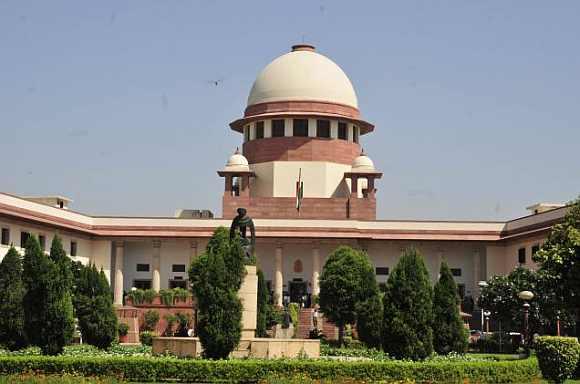 Reserving order on improving the existing collegium system for appointment of judges, the Supreme Court on Thursday gave the green signal for the present system to continue. The apex court said that collegium system of appointment shall not be put on hold.
Reserving order on improving the existing collegium system for appointment of judges, the Supreme Court on Thursday gave the green signal for the present system to continue. The apex court said that collegium system of appointment shall not be put on hold.
A five-judge bench of the court had earlier rejected the government's plea to replace the present collegium system, saying that the latter is competent enough to hear the suggestions being made on reforming the present system.
The Supreme Court bench asked the government to submit a draft memorandum of procedures for the functioning of the collegium.
On Thursday, the Centre expressed its inability before the Supreme Court in formulating the draft Memorandum of Procedure for appointment of judges in the higher judiciary.
Attorney General Mukul Rohatgi said, "It is not possible for the government to devise a draft MoP for judicial discussion. It is an unnecessary burden on this court. There is no procedure of draft MoP in the Constitution. We can't issue it."
Rohatgi rather asked the bench, headed by Justice J S Khehar, to issue directions for making the collegium system better and leave the task of drafting MoP.
The bench, during the hearing, made it clear that it does not want to supplant but only supplement to the framework devised in pursuance to the nine-judges-bench in the second and the third judges case.
The court was hearing the suggestions advanced by the government, lawyers and others for improving the collegium system of judicial appointments.
After hearing the suggestions by various lawyers, bar bodies and associations, the SC reserved its order on Thursday.
The government is of the view that the collegium system lays more emphasis on seniority and not merit.
In a conciliatory gesture, the apex court had said on Wednesday that the government could suggest names for appointment as judges to superior courts under the existing collegium system.
In its earlier order, the Supreme Court had struck down the National Judicial Appointments Commission Act introduced by the government in Parliament for passage, which had caused strain in the relations between the judiciary and executive.











